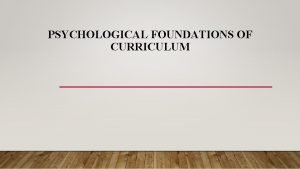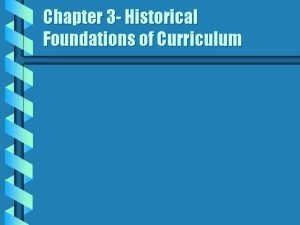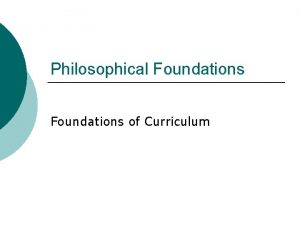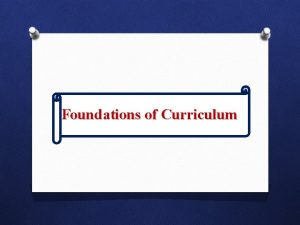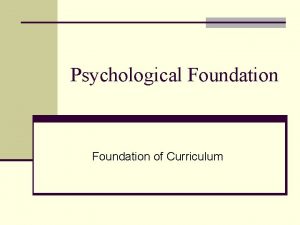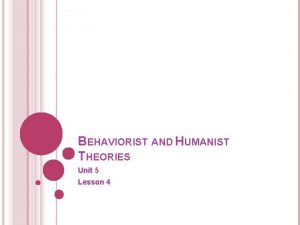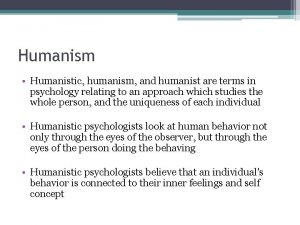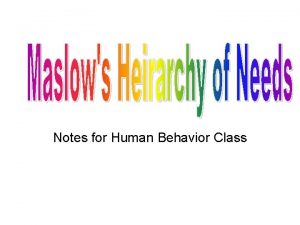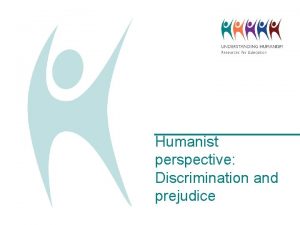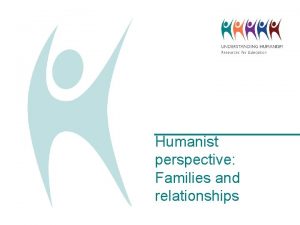PSYCHOLOGICAL FOUNDATIONS OF CURRICULUM HUMANISM HUMANIST PSYCHOLOGIST Concerned














- Slides: 14

PSYCHOLOGICAL FOUNDATIONS OF CURRICULUM

HUMANISM

HUMANIST PSYCHOLOGIST • Concerned with how learners can develop their human potential. • The learner is a person who has feelings, attitudes and emotions. • Past experiences such as failing grades have a huge impact on the student’s current inability to learn • Emotions such as self-efficacy, self-assurance, intrinsic and extrinsic motivation determine how a student approaches learning.

ABRAHAM MASLOW • Maslow’s Hierarchy of Needs • Lower levels must be satisfied first before one could function at the higher level • He observed that humans are constantly striving to control their behavior and seeking to gratify themselves. • Schools cannot control all the influence that impinges on a learner, but they can create an atmosphere of trust, warmth and care.

ABRAHAM MASLOW

ABRAHAM MASLOW • At the lowest level are physiological need s, at the highest selfactualization. Only when the lower needs are met is it possible to fully move on to the next level. A motive/desire at the lower level is always stronger than those at higher levels.

CARL ROGERS • He was a humanistic psychologist agreed with most of what Maslow believed, but added that for a person to ‘grow’, they need an environment that provides them with genuineness (openness and self-disclosure), acceptance (being seen with unconditional positive regard), and empathy (being listened to and understood). • Client-centered therapy • He proposed that classrooms should become learner-centered and teachers should facilitate learning

CARL ROGERS Person centered theory Rogers identified five characteristics of the fully functioning person; q Open to experience q Existential living q Trust feelings q Creativity

GESTALT PSYCHOLOGY • Learning can be explained in terms of the wholeness of the problem and where the environment is changing and the learner is continuously reorganizing his/her perceptions.

HUMANISTIC • The main components of the humanistic approach are that the lessons are Student-centered. Humanism allows students for social personal development. • The whole process is about Discovery. Students are encouraged to go out there and find out information and it is up to them to decide which information they think is relevant. Ultimately, the teacher or guider must respect student's feelings and aspirations.

HUMANISTIC VS BEHAVIORISM • A child learns because he or she is inwardly driven, and derives his or her reward from the sense of achievement that having learned something affords. • This would differ from the behaviorist view that would expect extrinsic rewards to be more effective. Extrinsic rewards are rewards from the world, e. g. praise, money, gold stars, etc. Intrinsic rewards are rewards from within oneself, rather like a satisfaction of a need. • Behaviorism is about rewards from others. Humanism is about rewarding yourself!

HUMANISTIC VS BEHAVIORISM • The behaviorists might advocate positive reinforcement such as praise, and punishment in the form of negative criticism. Both praise and blame are rejected by the humanists. • Children can become addicted to praise, and put much effort into receiving praise from their teachers. Such children will often work for the praise, and not work if their efforts go unnoticed.

SIMILARITIES OF MASLOW AND ROGERS • Two theories are similar in terms of their explanation and definition of self actualization- similar characteristics and features. • Both Maslow and Rogers agrees that everyone is good and have the ability to self actualize. • Both saw self-actualization and fully functioning as the ultimate potential an individual should strive toward.

COMPARISON OF MASLOW AND ROGERS • Maslow fully acknowledges the self-actualization of individuals to their very self. Rogers does not credit the individual only for selfactualization but emphasize on the necessity of the environment especially through empathy, genuineness, and acceptance of others that result in a condition for growth. • Rogers thinks that all people can aim to become self actualized on the other hands Maslow only believes that a little percentage can strive to that level.
 Behaviorism vs humanism
Behaviorism vs humanism What is incongruence in psychology
What is incongruence in psychology Historical foundations of curriculum
Historical foundations of curriculum Curriculum trends in essentialism
Curriculum trends in essentialism Philosophical foundations of curriculum
Philosophical foundations of curriculum What are the 3 foundations of curriculum?
What are the 3 foundations of curriculum? Psychological foundation of curriculum
Psychological foundation of curriculum Renaissance art reflected the humanist interest in
Renaissance art reflected the humanist interest in Humanism ap world history
Humanism ap world history Secularism
Secularism Lesson 4 humanistic theories
Lesson 4 humanistic theories Humanist views on capital punishment
Humanist views on capital punishment Humanist views on euthanasia
Humanist views on euthanasia Humanist movement
Humanist movement Wedding vows humanist
Wedding vows humanist
